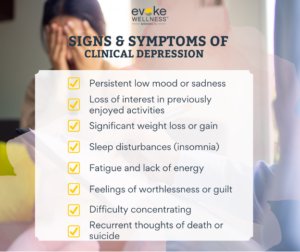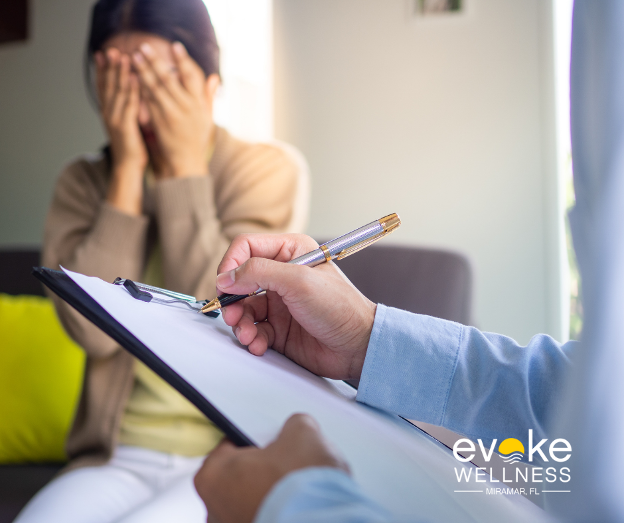You feel the darkness creeping in. The heavy weight on your chest that makes it hard to get out of bed. The lack of energy or motivation to do anything. The sadness and hopelessness that never seems to lift. You may be one of the estimated 17 million U.S. adults suffering from clinical depression. While the journey is difficult, there is hope. In this blog, we’ll explore the latest treatments and programs that can help lead you back into the light. We’ll discuss new medications and therapeutic techniques that are achieving remarkable results. We’ll provide an overview of programs tailored for depression, bipolar disorder, anxiety, PTSD, anger issues, veterans’ unique needs, and more. You don’t have to keep suffering alone. Help and healing are available. Read on to learn about emerging treatments in 2024 that can help you reclaim your life.
Call Evoke Wellness at Miramar today (833) 819-6066 or reach out online.
What Is Clinical Depression?
Clinical depression, also known as major depressive disorder, is a severe and persistent mental health condition characterized by prolonged periods of intense sadness, hopelessness, and loss of interest in activities once enjoyed. It goes beyond typical feelings of sadness, impacting an individual’s ability to function in daily life.
Key Symptoms
- Persistent low mood or feelings of emptiness
- Significant weight loss/gain or changes in appetite
- Insomnia or hypersomnia (excessive sleeping)
- Fatigue and lack of energy
- Feelings of worthlessness or excessive guilt
- Difficulty concentrating or indecisiveness
- Recurrent thoughts of death or suicidal ideation
As per the National Institute of Mental Health, clinical depression affected an estimated 21 million adults in the United States in 2020, highlighting its prevalence.
Underlying Causes
While the exact causes are not fully understood, clinical depression likely results from a combination of genetic, biological, environmental, and psychological factors. Potential contributors include:
- Brain chemistry imbalances
- Hormonal changes or imbalances
- Inherited traits or family history
- Traumatic life events or chronic stress
- Certain medical conditions or medications
- Substance abuse disorders
Seeking professional help through therapy, medication, or a holistic treatment program is crucial for managing clinical depression’s debilitating symptoms.
Signs and Symptoms of Clinical Depression
Common Emotional Signs
Clinical depression is characterized by persistent feelings of sadness, emptiness, hopelessness, and worthlessness. You may lose interest or pleasure in activities you once enjoyed, struggle with low self-esteem, and experience excessive guilt or self-blame. According to Stanford’s Human-Centered AI group, depression affects over 300 million people worldwide.
Physical Manifestations
Depression can manifest physically through fatigue, insomnia or hypersomnia, significant weight changes, and psychomotor agitation or retardation.
Causes and Risk Factors for Clinical Depression
Genetic Predisposition
- Depression can run in families, suggesting a genetic link. Those with a family history are at higher risk.
- However, depression can also occur in people without a family history of the disorder.
Brain Chemistry
- Imbalances in brain chemicals called neurotransmitters like serotonin, dopamine, and norepinephrine can contribute to depression.
- Trauma, stress, or medical conditions may trigger chemical disruptions leading to depressive episodes.
Life Events
- Stressful life changes or traumatic events like loss of a loved one, job loss, divorce, etc. can trigger depression.
- Major life transitions or chronic stressors also increase vulnerability.
Medical Conditions
- Certain medical issues like chronic illness, insomnia, chronic pain, etc. may trigger or exacerbate depression symptoms.
- Conditions affecting the brain like Parkinson’s, stroke, or cancer treatment can also increase depression risk.
Substance Abuse
- Alcohol or drug abuse can worsen or trigger depression in some individuals.
- Alcoholism can lead to depression if left untreated, creating a vicious cycle.
While everyone experiences sadness, the causes behind clinical depression are complex. Seeking professional help is crucial for proper diagnosis and treatment.
Diagnosing Clinical Depression
Signs & Symptoms
Clinical depression, or major depressive disorder, is a serious mental health condition characterized by persistent sadness, loss of interest, and impaired functioning. According to the Centers for Disease Control and Prevention, around 8.4% of American adults aged 20 and over had depression in 2020. Recognizing the signs is crucial for proper diagnosis and treatment.

Professional Evaluation
A mental health professional, such as a psychiatrist or psychologist, can conduct a comprehensive evaluation to diagnose clinical depression accurately. According to the Diagnostic and Statistical Manual of Mental Disorders (DSM-5), the criteria involve experiencing multiple symptoms for at least two weeks, causing significant distress or impairment in daily life.
Personalized Treatment Plan
Once diagnosed, a personalized treatment plan may be developed, often involving a combination of psychotherapy (such as cognitive-behavioral therapy) and medication (antidepressants). Evoke Wellness at Miramar offers a dedicated Depression Treatment Program as part of their mental health services, designed to help individuals manage symptoms and improve overall well-being. Early diagnosis and appropriate treatment are crucial for recovery and prevention of potential complications.
Treating Clinical Depression
At Evoke Wellness, we understand the profound impact clinical depression can have on one’s life. Our specialized Depression Treatment Program employs a holistic approach, combining evidence-based therapies with compassionate care to help individuals find their path to healing.
Comprehensive Therapeutic Approaches
Our multidisciplinary team of mental health professionals utilizes a range of therapeutic modalities to address the unique needs of each client, including:
- Cognitive-Behavioral Therapy (CBT)
- Dialectical Behavior Therapy (DBT)
- Acceptance and Commitment Therapy (ACT)
- Individual and Group Therapy Sessions
- Trauma-Informed Care
We also incorporate complementary therapies like acupuncture, yoga, and mindfulness practices to promote overall well-being.
Personalized Treatment Plans
At the heart of our Depression Treatment Program is a personalized treatment plan tailored to each client’s specific needs. Our team works closely with individuals to identify underlying factors contributing to their depression, develop coping strategies, and build resilience for long-term recovery.
Dual Diagnosis Support
For those struggling with co-occurring substance use disorders, our Dual Diagnosis Treatment Program offers integrated care, addressing both mental health concerns and addiction simultaneously. This comprehensive approach enhances the chances of achieving lasting recovery.
Clinical Depression Treatment Programs at Evoke Wellness Miramar
At Evoke Wellness Miramar, individuals struggling with clinical depression can access a comprehensive Depression Treatment Program designed to promote lasting recovery. This state-of-the-art program utilizes evidence-based therapies like:
Cognitive-Behavioral Therapy (CBT)
CBT helps identify and modify negative thought patterns contributing to depression. Clients learn coping strategies to reframe harmful beliefs.
Dialectical Behavior Therapy (DBT)
Through DBT, clients develop mindfulness, emotion regulation, and interpersonal effectiveness skills to overcome depression’s challenges.
Holistic Approaches
Acupuncture, yoga, and nutritional counseling complement traditional psychotherapy, promoting overall well-being.
The multidisciplinary treatment team, including licensed therapists and psychiatrists, creates personalized plans addressing each client’s unique needs. With dual diagnosis support for co-occurring disorders like anxiety or substance abuse, Evoke Wellness enables a comprehensive path to mental wellness.
Frequently Asked Questions About Clinical Depression Treatment
What Therapies Are Used?
A comprehensive depression treatment program utilizes various evidence-based psychotherapies like Cognitive Behavioral Therapy (CBT) and Dialectical Behavior Therapy (DBT). These help patients recognize unhealthy patterns, reframe negative thoughts, and develop coping mechanisms. Family therapy, individual counseling, and group sessions are also incorporated.
Is Medication Involved?
While therapy is the foundation, medication may be utilized to manage severe symptoms or co-occurring disorders alongside clinical depression. Prescribed medications can alleviate withdrawal effects and stabilize brain chemistry. However, a comprehensive treatment plan aims to minimize dependence on drugs through holistic healing.
What About Holistic Approaches?
Absolutely. Holistic therapies like yoga, meditation, mindfulness, nutritional counseling, exercise, and creative arts are integrated to promote overall well-being during recovery from clinical depression. These mind-body practices reduce stress, improve self-awareness, and cultivate healthy coping skills.
Conclusion
Ultimately, while depression remains an immense challenge, there is hope. With effective therapies, compassionate care, and ongoing research, recovery is possible. By choosing professional treatment, committing to the process, and utilizing available resources, your outlook can brighten. Embrace the support systems around you. Believe in your inner resilience. The path ahead may not be easy, but you have the strength to persist. One small step leads to another until the darkness lifts. Forge onward. The dawn awaits.
Begin Your Journey with Evoke Wellness at Miramar
If you or a loved one is considering treatment, Evoke Wellness at Miramar invites you to contact us. Our compassionate team is ready to answer your questions, discuss your needs, and help you take the first steps toward recovery. In Miramar, you’ll find more than just a treatment program – you’ll discover a community dedicated to your wellness and success. Together, let’s embrace the journey to recovery and the promise of a new beginning. Call us at (833) 819-6066 today or reach out online.


